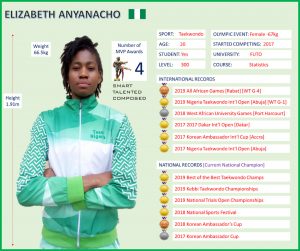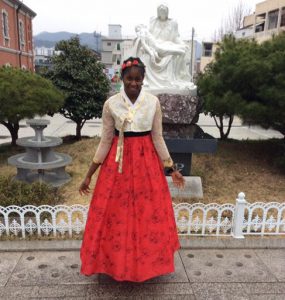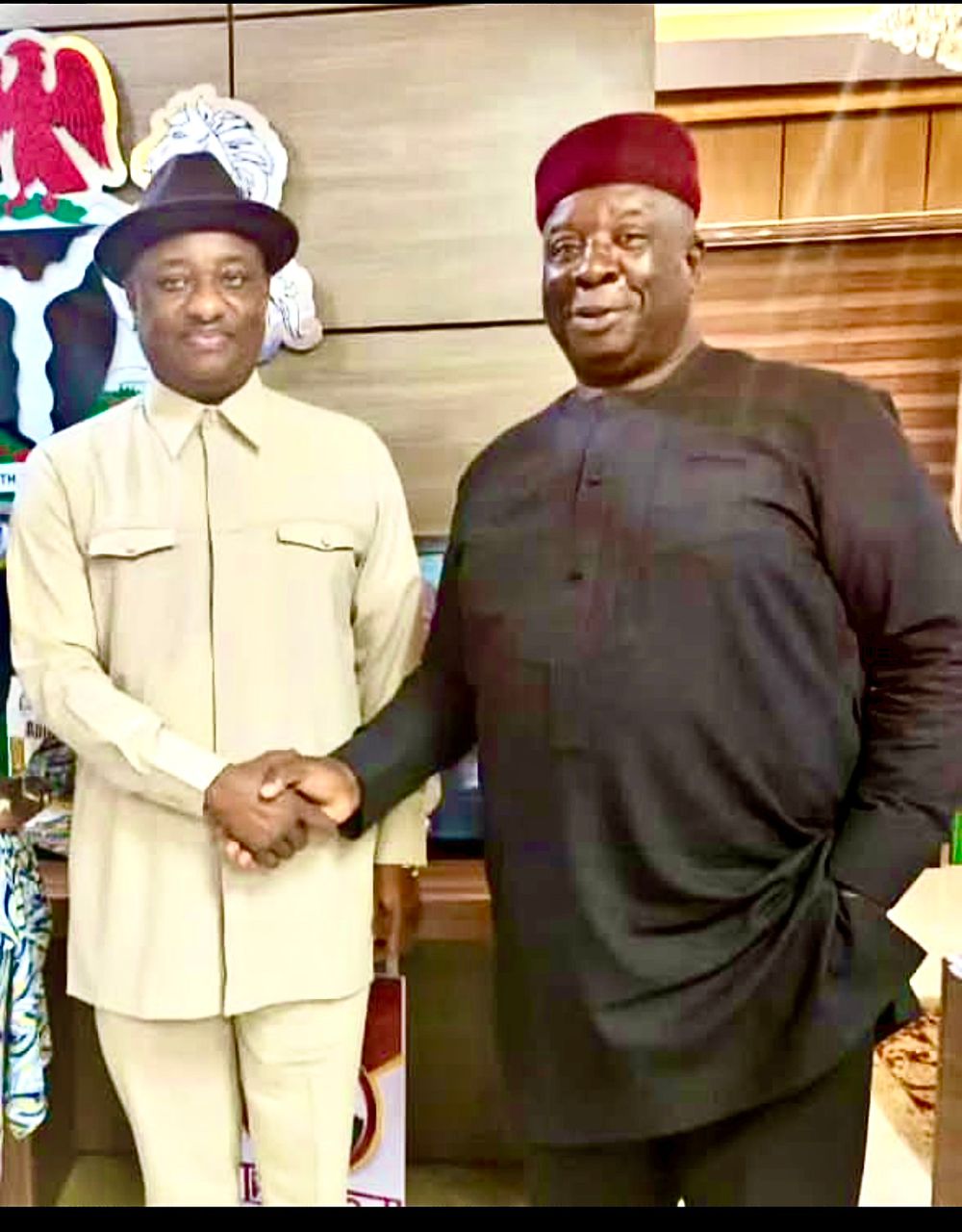Featured
Despite Anxiety, I dream to Achieve and to Inspire – Anyanacho

African Bronze medalist, Elizabeth Anyanacho, has been one of the best female talents to emerge in recent years on the Nigeria Taekwondo circuit. The number one seed has picked up an impressive SEVEN GOLD Medals, One Silver and One Bronze in the past Nine National Tournaments dating back to 2017 and has been undefeated since December 2017.

In 2019, the 20-year-old has a stellar year after she won three national gold medals and two international medals – a gold at the World Taekwondo [WT] G-1 ranked Nigeria Taekwondo International Open and a Bronze at the WT G-4 ranked 12th All African Games, efforts which saw the talented competitors break into the world’s top 100 competitors with a current world ranking of 86.
The gangly 6 ft 2” tall youth, who is a student of the Federal University of Technology Owerri has surprised many with her natural physical abilities and development.
In this interview, the soft-spoken African Bronze Medalist speaks of her Taekwondo journey, the impact of the last All African Games on her FUTO experience and her projections for the future.
Winning a major international medal at the last all African games made you an overnight celebrity in FUTO. How are you coping with this development?
By nature, I always keep a low profile, so I do not really think it was that publicized in school. I keep my head down and ensure I do not attract too much attention so I can cope with my studies and training, which is very hectic. I do not think I am famous. I am just happy I won an international medal for my country and it reflected positively on my university, who have been very supportive.
Quite a few countries indicated interest for you to come & train with their teams. But you passed up on some of these opportunities because of your school schedule. What informed your decision?
My school schedule is very tight, and it is so hectic being a student-athlete. I do not want to lose so much school time that I would have an extra year, and this is why I could not accept some of these invitations as it clashed with important academic periods. But I would really love to have more international training experiences so I could learn more from other teams and people. Hopefully, when I am done in two years, I can have more international training camping experiences.

How important is education to you?
Completing my education is important because an athlete will retire someday and it is this kind of investment in education today that will make it easier in the future as it will increase the opportunities available to one.
How are you combining the rigors of university education with elite sports training?
It is all about time-management and discipline. It is very difficult especially as there are limited resources. I hope to secure sponsors as a deal will me strive to achieve in both areas while being a good ambassador. Sometimes, when it gets too difficult, I just commit everything to God Almighty, and the truth is that it is always so difficult, so I am always putting everything into the hands of God. I will keep training hard and I will leave it to my coaches and managers to find and work out a sponsorship deal for me.
After the 12th All African Games, you missed out on the Korean Ambassador’s Cup, then went on to snatch Gold medals at the Kebbi Open and Best of the Best? Can you reflect on this?
I apologize that I missed the Korean Ambassador Cup. I really want to come and compete, but it was happening at the same time as my examinations, so I had to stay back and write about my exams. Balancing school and a sports career require a compromise on so many occasions. This was one of those kinds of decisions. But for the Korean Ambassador Cup, I was happy when I saw that my Team CCSF teammate, Bukola Ogunnusi, went there and won a gold in my category. It was as if she won for me and for all of us. I am also happy I went to Kebbi Open. There were not a lot of competitors in my category, but I enjoyed my podium experiences.
At the Best of the Best, I trained hard for it because I wanted to end the year strongly. Training at our training camp was so difficult, both physically and mentally. I am glad the training paid off. My opponents were tough and even though I won the gold, I took home learning points to work on, once my training begins in 2020.
How did you start Taekwondo?
I was 15 when I started athletics and a few weeks after I started athletics, I met Mr. Uche and Chika Chukwumerije at the stadium. My coach, Sam, did not come to training so he asked my mentor, Chika Chukwumerije to allow me to join his training session. He had a project with training students at Government Secondary Schools, and my school in Lugbe was among them. So he agreed. I did the sessions. It was plyometrics and a lot of drills I have never seen, and I really enjoyed it. From there, I started coming for training and I was combining athletics and Taekwondo. I started competing in grassroots taekwondo events in FCT, I did three in 2016 and two in 2017, and I won all five and I was delighted because I was just a white – yellow belter. In 2017, Mr. Chika to my first internationals. I was worried because I had not even done any national before, but he believed a lot in my talent. I ended up winning gold medals in Ghana and Senegal and the MVP trophies. Then came the Nationals – I won the National Sports Festival, National Trials, Best of the Best and other high profile events. So my journey has been really intense training sessions and competitions and outside of competitions, we do a lot of computer training and event management. I am grateful for my journey so far and dream of achieving a lot more.
Many athletes dream of going to the Tokyo 2020 Olympics. What would it mean to you?
Of course, it would mean a lot if I can get the opportunity to get the Olympic ticket. I am in good form and have developed so much over the past three years. It would be my first time, but this is the dream of every athlete – to be on the highest ever stage and to win a medal. I know it will be difficult and this is why I keep working so hard so as to make this dream a reality.
What do you expect from the World Taekwondo Coach Certification Course as your last taekwondo activity in 2020?
“The course has helped me to familiarize myself with the WT rules and it has also helped me understand my rights as an athlete. From a coaching perspective, it will help me see what an athlete usually misses and this will help me very much as an athlete to understand better a coach’s instruction during a training session or a competition.
How have you been spending your Holidays?
With my family in Abuja. I did not travel because I did not want to spend all my energy during the festivities. I have been enjoying my rest time from training, enjoy spending quality time with my parents and siblings, and I have started re-booting for the new year. Also, it has been a period for me to pray and reflect on the new year and commit myself and plans to God.
What is your focus in 2020?
I want to keep improving my performance in my studies and in the competition arena. I am so anxious about this because I want to do well and succeed, and I know hard work is key to achieving this. This will help to also encourage women and young people around me. So despite my anxiety, I dream to inspire and to achieve. In 2020, I will stay focused on studying hard while simultaneously training hard for all major and minor competitive events
Featured
CELEBRATING A CENTURY-OLD CIVIL AVIATION SECTOR TRAJECTORY IN NIGERIA

This week, millions of Nigerians and others across the globe will join the Ministry of Aviation and Space Development under the irrepressible leadership of the Honourable Minister, Festus Keyamo(SAN),and all the notable Aviation sector stakeholders in and outside the country,in celebrating a century of Nigeria’s civil aviation history.
There is no doubt that under the present leadership of the Honourable Minister and within the short spell of time in his stewardship,he has consciously and intentionally embarked on a “silent revolution” for the industry with very veritable and laudable landmarks that have consistently grown the industry.
Some of these spirited efforts for instance have consequently led to trust restoration amongst international lessors, financier,any global partners.Of note also is assidiously working for the full domestication and implementation of the “Cape Town Convention Agreement” ,which gives Airlines access to modern fleets of competitive rates as well as enforcement of IDERA(Irrevocable Deregulation and Export Request Authorization).
Having well applauded these vital contemporary initiatives,it will also be germane to cast our minds in retrospect by taking a peep into our history over several decades to recognise some of the notable forebears in the industry whose impressionabl efforts cannot be overlooked,as they took the impetuous initiatives of breaking the ice at the nascent stage.
It will aptly corroborate the truism which says that… ” a journey of a thousand miles starts with one step”.
The above is vividly captured from a tribute by the First Republic Minister of Aviation Chief Mbazulike Amaechi at the funeral of late Igwe of Oba,HRH Peter Ezenwa(MFR) in 2018.
It states inter alia…”One significant thing I will say many people didn’t know is that the first indigenous airline that was to run in Nigeria was known as “STANDARD AIRLINE”.It was founded in 1966 by a company formed by Igwe Peter Ezenwa from Oba,and had on board,John Nwankwu from Abagana,Edward Ebo from Ezinifitte,(all from Anambra state),John Anyaehie from Nkwerre in Imo state,and lastly my very self Mbazulike Amaechi.
The five of us later acquired two brand new aircrafts,and had four pilots,namely;Unachievable,John Emma Ngwu and Felix Offor,who was to be the General Manager of the airline.
But just about the time for the take-off the crisis of the military takeover erupted in the North as the planes were on their way for delivery to us.In fact the bank handling the transaction was to allow the planes to be flown from the USA,but the news of the war broke out in 1967,the insurance company cabled for the cancellation of the deal as they will not be able to cover the risk cost of aircrafts being flown into war zone.
So,we asked the manufacturers to take the two aircrafts back to their country and hold on for six months with the hope of that the war will end within the requested time frame,but the war didn’t end as thought.We consequently asked for refund and they deducted some money and refunded the balance which was deposited at the London branch of African Continental Bank(ACB).
When the government took over the operations of ACB,we still hoped for the refund but unfortunately were disappointed that the Federal government took over the whole money and we lost everything.”
Further in line with our historical perspective,it will also be pertinent some of the later years reformists in the likes of Engr Onyereri and Harold Demuren who advertently sponsored some far reaching regulations that eventually steered the industry towards greater autonomy with the passage of the 2005 Civil Aviation Act,which I was also a prime participant of in my capacity as an Aviation sub chair in then House of Representatives.
As we mark this great century milestone,and with the clear evidential pathway set out by the current managers of the industry under the indomitable leadership of Honourable Minister, I do not see the sky posing any limitations as they say,but rather availing new vistas of limitless growth opportunities.
CONGRATULATIONS.
Hon Chidi Nwogu
Former member House of Representatives & presently Governing Council member
,African Aviation and Aerospace University,Abuja.
-

 Featured6 years ago
Featured6 years agoLampard Names New Chelsea Manager
-

 Featured6 years ago
Featured6 years agoFG To Extends Lockdown In FCT, Lagos Ogun states For 7days
-

 Featured6 years ago
Featured6 years agoChildren Custody: Court Adjourns Mike Ezuruonye, Wife’s Case To April 7
-

 Featured6 years ago
Featured6 years agoNYSC Dismisses Report Of DG’s Plan To Islamize Benue Orientation Camp
-

 Featured4 years ago
Featured4 years agoTransfer Saga: How Mikel Obi Refused to compensate me After I Linked Him Worth $4m Deal In Kuwait SC – Okafor
-
Sports3 years ago
TINUBU LAMBAST DELE MOMODU
-

 News12 months ago
News12 months agoZulu to Super Eagles B team, President Tinubu is happy with you
-
Featured6 years ago
Board urges FG to establish one-stop rehabilitation centres in 6 geopolitical zones
